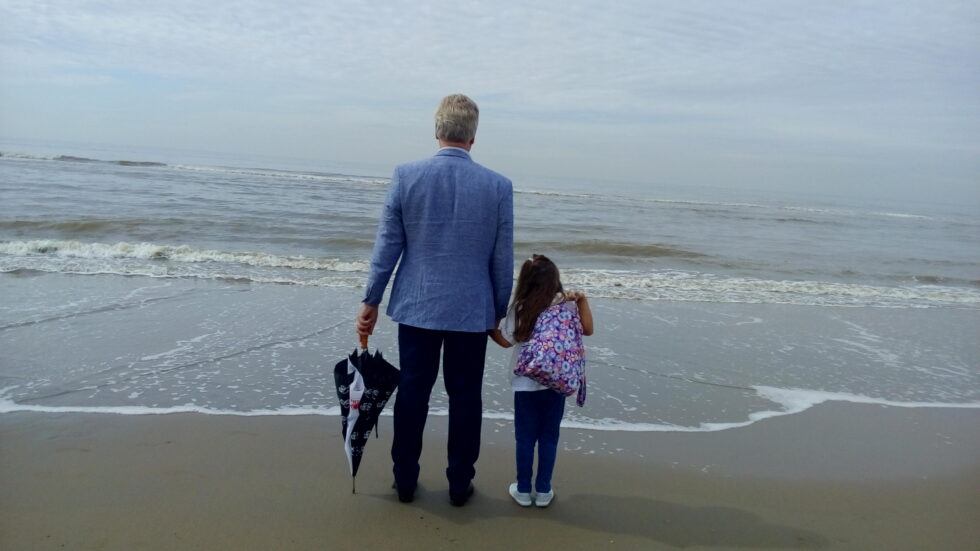Every month in ‘Dol op de Duinen” (Crazy about the Dunes) we put a volunteer or person involved from the Dune Conservation Foundation (Stichting Duinbehoud) in the spotlight. They explain why the dunes have a special place in their hearts. This time: Duinbehoud supporter and policy maker Rob Wolters.
Rob Wolters is a supporter and has been following the Dune Conservation Foundation since the early days. In his career he has been able to make a great impact in the protection of coastal areas, where he regularly collaborated with the Dune Conservation Foundation. He was closely involved in, among other things, the designation of protected nature areas, the coordination of EU nature policy and the creation of Natura2000.
Rob Wolters (65) was born near Hoorn (NL). Then the family moved to Venhuizen. As a little boy he often cycled with his fishing rod through the polder to the IJsselmeer to go fishing. The other family members also loved the coast and water. As a day out, they regularly crossed the province to swim in the sea at Zwanenwater near Callantsoog and enjoy the dunes. “Probably this combination helped me a lot to develop a lifelong love for the dunes and the coast,” he says. Later, while studying geography/planology in Groningen, he heard about the Dune Conservation Foundation, which had only existed for a short time. “I was very impressed by what Dune Conservation did and that is why I started following them.”
Do not expand further
Rob had his first real job at the Ministry of Agriculture, Nature and Food Quality in The Hague. At the time, he was only “a youngster”, he says, but was nevertheless given the responsible task of helping to designate nature reserves. These would be placed under the Nature Conservation Act, the most stringent means of preventing further harmful developments.
“Most of the designated dune areas were in Zeeland, such as De Manteling van Walcheren. Our work there sometimes encountered fierce resistance, partly because tourism was an important source of income for people there and there was also hunting. We have designated areas on the north and south sides of The Hague/Scheveningen, preventing the city from expanding further in the dunes. The dune area between The Hague and Katwijk was also designated. Later, areas in North Holland were also added to the list.”
From extension to beautiful solution
Rob Wolters was then asked for the project team to come up with a national nature policy plan. This led to the National Ecological Structure, which is now called Nature Network Netherlands. “We have again brought in the dunes and the coast as priorities. We proposed opening up the dunes in certain places to create more dynamics. That was swearing in the church at the time for the Dutch Government Agency Rijkswaterstaat, in charge of seadefence. We held on anyway and over time there was some movement and we were allowed to experiment with it on a small scale.”
“We gradually gained more and more support for working with nature. There was a growing realization that admitting the sea and making the dunes more dynamic might be a safer option than a hard defense against the sea. Gradually I saw that dynamic management of a threat started to change into a nice solution for others, including at Rijkswaterstaat. I have learned from this that if you enter into a discussion, you can sometimes arrive at new views together. But something like that takes time.”
International approach
Rob had meanwhile taken on a more international role at the ministry in the field of coordination of cross-border nature policy. He has always kept in touch with Albert Salman, who was director of the Dune Conservation Foundation at the time. At the time, Albert was setting up the international coastal organization EUCC. Rob was also involved in that.
“The Netherlands, together with Denmark, has the most extensive dune landscape in Northwest Europe. That is why we wanted to take the step towards an EU policy to protect all vulnerable coastal areas in the EU. They came under increasing pressure.” Together with Albert Salman, he therefore organized the first European Coastal Conservation Conference in Scheveningen in 1991, a conference that according to Rob made an important contribution to the development of EU policy for integrated management of coastal areas.
All necessary space
“At the ministry I was responsible for coordinating EU nature policy for a while. At the time, the Netherlands was EU president and I was tasked with trying to find EU consensus about the acceptance of the Habitats Directive, which forms the basis of Natura 2000. It covers most of the Dutch coast, just like many other nature areas.”
“Countries such as Spain and Ireland still had a lot of nature, but it was under pressure. At first they were not in favor of Natura 2000. At that time we still thought that our country had it reasonably well organized and we were given all necessary space to prioritize this dossier in the EU negotiations . It later became apparent how much we ourselves would need Natura 2000 to safeguard nature in the Netherlands.”
“I have always been allowed to sit in positions in which I could ‘put dents in packets of butter’. Of course you never do that alone, always with a lot of others. And of course, as far as government policy is concerned, the ministers ultimately bear the final responsibility.”
Our life line
After his time at the ministry, Rob Wolters has been director of a number of international institutions in the field of nature and sustainability. He is currently the executive at the Nature For Health foundation. “There is nothing healthier than the coast. They are a source of health of the first order. This was also recently stated in a report by WHO. It is not for nothing that we used to have many spas there.”
“Think away the Dutch dunes and the coast and you have a much less healthy population in North and South Holland and Zeeland. Moreover, you miss out on a lot of income through tourism. The coast and the dunes are essential for our health, for the national and regional economy, for climate control, for water buffers. They are our lifeline.”
Rob has been living in the province of North-Brabant for some time now. Also very beautiful, he thinks. But he does miss the sea and the coast. He is still involved in the Dune Conservation Foundation as a supporter. One of his favorite dune areas is Meijendel. He lived nearby for a long time. “I was able to fully recharge there. It moved me when I walked there in the spring and heard the nightingale.” He also appreciates a smaller dune area such as the Nettenboetsersveld near The Hague, but mainly because of the cultural dimension. “The fishermen’s wives have been repairing the nets there. You can see through the ages.”
Copyright: Stichting Duinbehoud, 2023. Source: https://www.duinbehoud.nl/dol-op-de-duinen-rob-wolters/
Picture: Anahi Iraizoz

